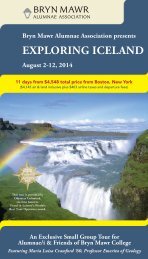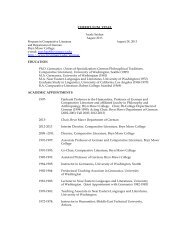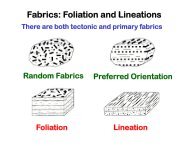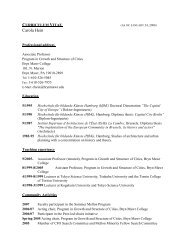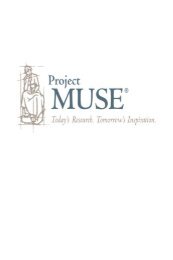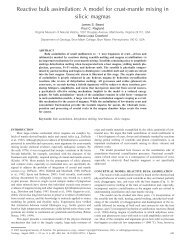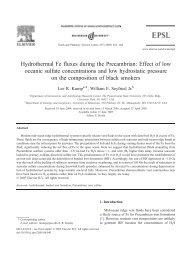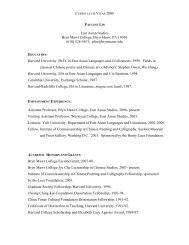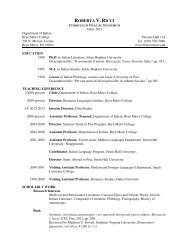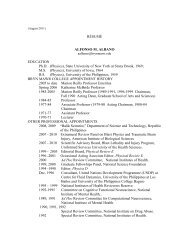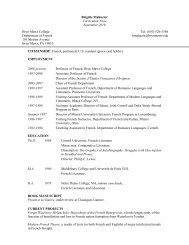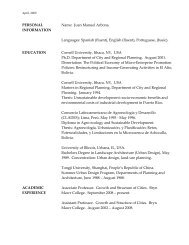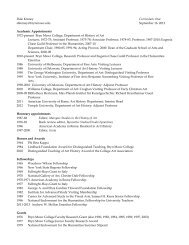Tearing Apart the Zagreus Myth - Bryn Mawr College
Tearing Apart the Zagreus Myth - Bryn Mawr College
Tearing Apart the Zagreus Myth - Bryn Mawr College
Create successful ePaper yourself
Turn your PDF publications into a flip-book with our unique Google optimized e-Paper software.
EDMONDS: <strong>Tearing</strong> <strong>Apart</strong> <strong>the</strong> <strong>Zagreus</strong> <strong>Myth</strong> 61<br />
against it <strong>the</strong> Protestant reformers with <strong>the</strong>ir “justification by faith” and<br />
bibliolatrous attitude to <strong>the</strong> canonical writings. 75<br />
The Orphic reform, according to <strong>the</strong>se scholars, spiritualized <strong>the</strong> meaningless<br />
rituals of traditional religion and gave <strong>the</strong>m a significance for <strong>the</strong> individual in<br />
his relations with <strong>the</strong> divine, just as <strong>the</strong> Protestant Reformation did away with<br />
<strong>the</strong> ritualism of <strong>the</strong> Catholic Church and focused on <strong>the</strong> relation of <strong>the</strong> individual<br />
with God. Of <strong>the</strong> rituals of Homeric religion, Watmough claims, “The important<br />
fact is that <strong>the</strong>y were devoid of moral and spiritual significance. With ‘Orphism’<br />
much of <strong>the</strong> ritualistic and ceremonial element is retained, but behind <strong>the</strong>re is<br />
much more real and much more personal yearning to escape from an abstract<br />
power called Evil.... The parallel in modern Protestantism is clear to <strong>the</strong> most<br />
superficial observer.” 76 Orphism even surpasses <strong>the</strong> o<strong>the</strong>r mystery religions with<br />
this emphasis on <strong>the</strong> personal and spiritual ra<strong>the</strong>r than ritual and ceremonial<br />
elements. Morford and Lenardon compare Orphism with <strong>the</strong> most famous of <strong>the</strong><br />
mystery cults, <strong>the</strong> Eleusinian Mysteries: “The mysteries of Demeter, with <strong>the</strong>ir<br />
emphasis on participation in certain dramatic rites, lacked <strong>the</strong> spiritual depth of<br />
Orphism with its insistence on <strong>the</strong> good life as well as mere initiation and ritual.” 77<br />
The point of all <strong>the</strong>se comparisons is that Orphism is higher up on <strong>the</strong> scale<br />
of religions than <strong>the</strong> o<strong>the</strong>r forms of Greek religion (be it Dionysism, Homeric<br />
cult or <strong>the</strong> o<strong>the</strong>r mystery cults), just as, for <strong>the</strong> same reasons, Protestantism (or a<br />
reformed version of modern Catholicism) is higher than medieval Catholicism.<br />
Protestantism was thus mapped onto ano<strong>the</strong>r of <strong>the</strong> dominant paradigms of <strong>the</strong><br />
day, <strong>the</strong> idea of <strong>the</strong> evolution of mankind in terms of a growing rationality and<br />
individuation. As Orphism represents an advance on <strong>the</strong> o<strong>the</strong>r forms of Greek<br />
religion, so Christianity represents an advance on <strong>the</strong> earlier Greek religions,<br />
and so too Protestantism represents an advance over medieval Catholicism in<br />
terms of rational <strong>the</strong>ology for <strong>the</strong> individual. Macchioro explicitly posits an<br />
evolutionary scale of religions, progressing from <strong>the</strong> childishly irrational to <strong>the</strong><br />
maturely reasonable and spiritual: “Human spiritual evolution progresses from<br />
a maximum to a minimum of imagination. It seems that <strong>the</strong> path of history<br />
leads mankind from fantasy to reason, from a mythical to a logical condition.<br />
Perhaps progress consists in getting rid of that overwhelming power of fantasy,<br />
which seems to dominate children and primitive people.” 78 Orphism is thus for<br />
Macchioro <strong>the</strong> step on <strong>the</strong> road from pagan myth to Christian religion. 79<br />
This construction of Orphism served in <strong>the</strong> debates about <strong>the</strong> nature of early<br />
Christianity as a foil to <strong>the</strong> mystery cults and o<strong>the</strong>r forms of Greek religion. Just as<br />
75. Watmough 1934:56–57.<br />
76. Watmough 1934:50.<br />
77. Morford and Lenardon 1999:280–81.<br />
78. Macchioro 1930:73.<br />
79. Literally. Macchioro argues, in a number of his books, that St. Paul was directly influenced<br />
by Orphism in his <strong>the</strong>ology.



